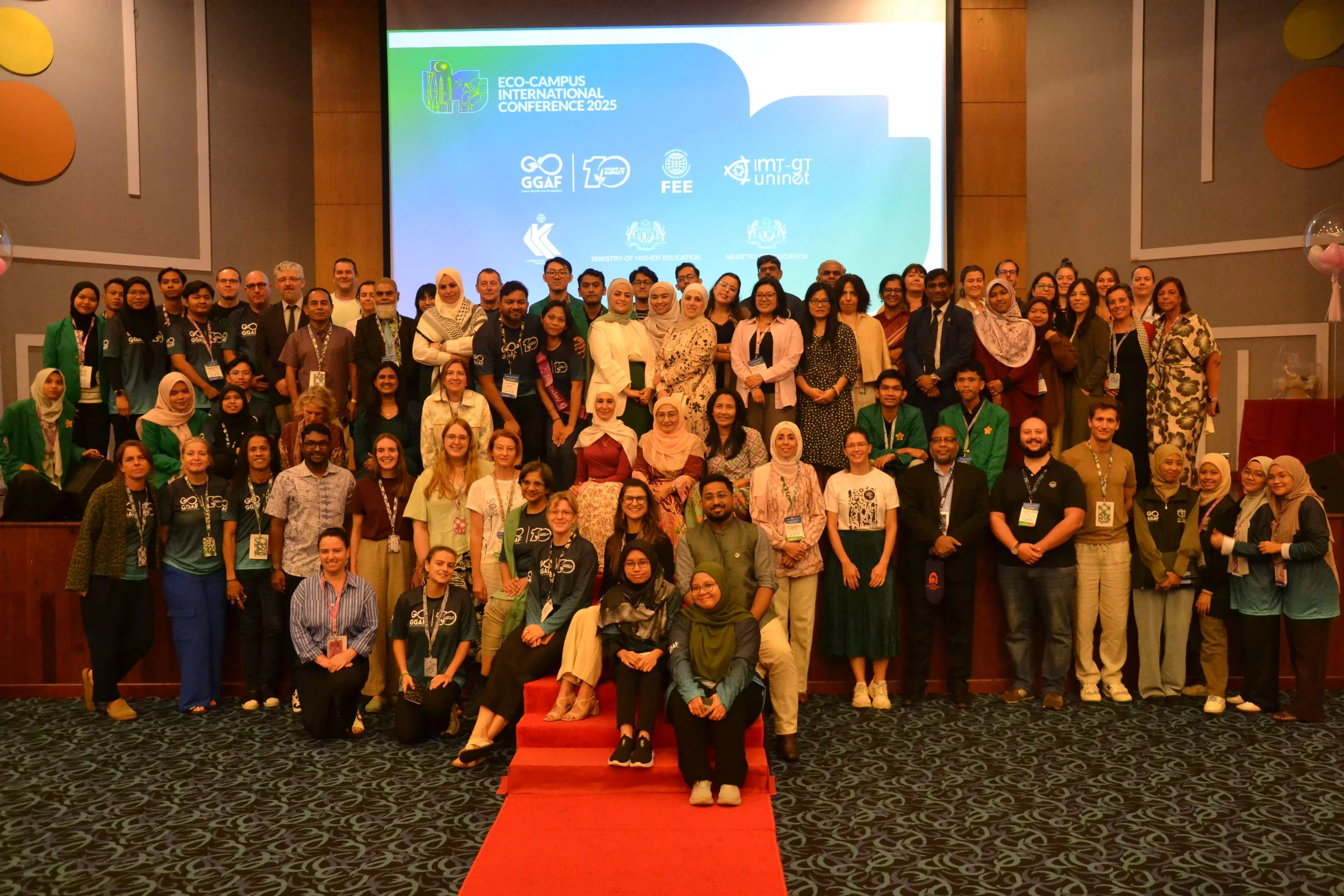Kuala Lumpur, Malaysia | 18–20 September 2025
The Eco-Campus International Conference (ECIC) 2025 brought together 150 participants from around 40 countries including higher education leaders, researchers, students, and partners from around the world to explore how universities can lead systemic climate action. Co-organised by the Green Growth Asia Foundation (GGAF) and the Foundation for Environmental Education (FEE), with IMT-GT UNINET and the International Youth Centre (IYC), this year’s conference advanced the theme: “Transforming Higher Education for Climate Action: A Whole-System Approach.”
The event also marked the 10th anniversary of GGAF - a milestone to celebrate!
Inspiring Voices
We were honoured by the presence of Her Highness Tengku Puteri Raja Ilisha Ameera, representing the Crown Prince of Pahang, who called on the Ministry of Education to endorse Eco-Campus as a national initiative
Inspiring keynote speaker Tan Sri Dzul reminded us that “climate change requires whole system change”, urging a shift from “Manpower, Mindset and Machine” to “Humanity, Heartset and High-touch (compassion) through Education for Sustainable Development (ESD)”
Katrin Kohl (UNESCO Co-Chair, York University) and Dr. Subarna Sivapalan (University of Nottingham Malaysia) shared findings from the UNESCO Transforming Futures project in a highly interactive session, exploring the Whole Institution Approach in the context of Higher Education and how this vision can be expanded to create a ‘Whole-System Approach’.
Professor Charles Hopkins (FEE/UNESCO Chair) ran a co-creative session ‘FEE University’ exploring 12 themes for systemic transformation in higher education proposed by participants, including sustainable leadership, inclusivity, student advocacy, and alumni engagement.
Pramod Kumar Sharma and Lee Wray-Davies (FEE Denmark) led a hands-on workshop on embedding ecosystem restoration in practice, taking frameworks into flagship projects.
We were also joined by Katerina Ananiadou, Coordinator of the Greening Education Partnership (GEP) Secretariat, UNESCO Paris who reinforced the essential role of higher education within the GEP vision.
The conference closed with an inspiring address by Prof. Dato’ Dr. Nor Aieni Haji Mokhtar, who reflected on her 40 years of academic and leadership experience to remind us of the transformative role of higher education in building resilience and sustainability.
Parallel Sessions
Across six tracks, the sessions showcased the diversity of approaches driving sustainability in education:
Whole-system approaches (chaired by Karen Chand, UN SDSN) highlighted interdisciplinarity, teacher training, and the role of HE in shaping real policy change.
Cross-sector partnerships (chaired by Dr. S. Anandan Shanmugam, GGAF) shared inspiring collaborations between HEIs, schools, NGOs, and industry.
Greening vocational education (chaired by Prof. Dr. Aftab Uddin, Bangladesh) presented how TVET and career counselling can prepare a green workforce.
Greening education across all levels (chaired by Prof. Paul Pace, FEE Malta) showed how local initiatives, from gardens to ethnographic studies, link schools and communities with higher education.
Sustainable campus initiatives (chaired by Margarida Gomes, ABAAE, Portugal) offered case studies from Portugal, Bangladesh, Ireland, India, Qatar, and Africa on embedding sustainability and treating campuses as living laboratories.
Student leadership (chaired by Deirdre O’Carroll, An Taisce, Ireland) celebrated student committees and research-led projects in areas such as renewable energy, biodiversity, and the circular economy.
Key outcomes
ECIC 2025 confirmed that the future of sustainability education lies in bridging levels, disciplines, and sectors - surfacing the many dimensions, collaborations, and partnerships that define a whole-system approach, and clarifying the vital roles higher education must play in driving climate-responsive transformation.
ECIC 2025 made clear that higher education is both a driver of systemic change and a bridge across education levels and sectors. Emerging outcomes included:
A shared articulation of the dimensions of a Whole-System Approach: governance, pedagogy, student leadership, teacher training, vocational pathways, industry partnerships, internships, policy engagement, campus operations, applied research, values, and contextual adaptation.
Renewed emphasis on teacher training and Continuous Professional Development to mainstream Education for Sustainable Development (ESD) across all levels of education.
Strong recognition of student leadership as central to climate solutions.
Evidence of how partnerships and local innovation can scale into global impact.
These align directly with the UNESCO Greening Education Partnership (GEP), which calls for system-wide change across schools, teacher training, curricula, and whole-institution transformation.
With Thanks
Our deepest thanks to our hosts and co-organisers, Green Growth Asia Foundation (GGAF), and to our partners and supporters: IMT-GT UNINET, International Youth Centre (IYC) Kuala Lumpur, Ministry of Higher Education Malaysia, Ministry of Education Malaysia, UNESCO, SDSN, Eco-Campus Sustainability Action Nexus, Asian Development Bank, ICLEI – Local Governments for Sustainability, Boh Tea Malaysia, Yayasan Petronas, The Datai Pledge, Axia Foundation. The support you’ve given has been such a huge help in making this gathering a reality.

